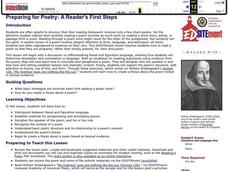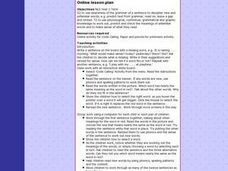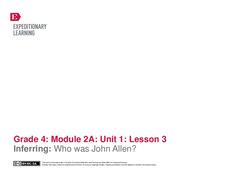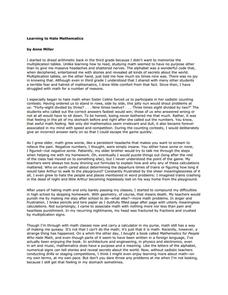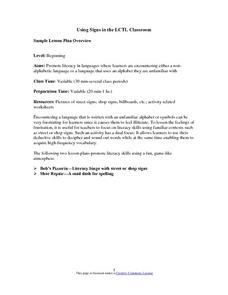Achieve3000
Figurative Language
Similes and metaphors make writing more beautiful and detailed, but can be a little harder to decipher during a first reading. Use a passage from The Man Who Loved Words to show young readers how to think through passages that contain...
Curated OER
Metaphor Meanings
Help your young writers decipher the literal meanings of metaphors. After reading several metaphors, learners write the real meanings that the phrases are describing. Use this resource in a figurative language lesson, or when preparing...
Curated OER
Borrowing Narrative Skills from Mr. Fletcher: Using a "Prompts in Reverse" Technique to Inspire Your Writers
Help your class find their writing voices with this instructional activity which uses the work of Ralph Fletcher to guide a "Prompt in Reverse" activity. Using the chapter "First Pen" from Fletcher's Marshfield Dreams, learners decipher...
Curated OER
Classified Advertisements: Target Language Practice
Foreign language learners decipher the meanings of classified ads in the target language. They investigate a large collage created by the teacher of foreign language advertisements and discuss the content with classmates. Then they...
ReadWriteThink
Comics in the Classroom as an Introduction to Narrative Structure
A picture is worth a thousand words, but a comic strip combines both images and words for the ultimate narrative effect. After reading The Three Little Pigs and deciphering the plot elements, elementary readers work through four...
Achieve3000
Context Clues and Idioms
Kids practice using five types of context clues (definition, synonym, antonym, example, and general) to decode idiomatic language.
Curated OER
Deciphering the Mechanics of Poetry
After a review of poetic terms, groups are given an object and they create a poem using a simile, a metaphor, internal rhyme, end rhyme, alliteration, and personification. Groups then exchange objects and repeat the process. Consider...
Macmillan Education
Slang
A four-part worksheet challenges scholars' knowledge of American, Australian, and British slang. Learners use context clues to decide which country a slang word is from, complete sentences, decipher a conversation, and answer questions.
Curated OER
Understanding King's Use of Metaphors in the
One of the most famous and well-crafted speeches of all time, Dr. Martin Luther King, Jr.'s "I Have a Dream" speech, consists of rich metaphors and rhetorical language. Using a provided graphic organizer, students analyze five quotes...
Tennessee State Museum
Deciphering the Document: Unlocking the Meaning of the Emancipation Proclamation
Help your learners truly understand the Emancipation Proclamation by asking them the put it into their own words. After reading the document out loud to the class, and briefly discussing the legal language, split your class into small...
Curated OER
Lesson: Paul Chan: Alternumeric Fonts
Learning to analyze language, symbols, and codes is part of becoming a deep and critical thinker. Young analysts consider their ability to see hidden messages as they analyze the work of Paul Chan. There are two fully developed...
Road to Grammar
Five Presentation Tips
Talking in front of others can be intimidating, especially when you aren't speaking in your native language. Put your English language learners at ease before a class presentation. They can follow these tips to give relaxed and effective...
Curated OER
Descriptive Writing: Parrot in the Oven
After reading a selection from Victor Martinez's Parrot in the Oven, pupils use the graphic organizer to decipher the sensory details within the descriptive paragraph. They list various details under the appropriate sense ("see," "hear,"...
Amazon Web Services
Idiom Dictionary
Examining idioms is a peace of cake when using this graphic organizer! Here, grammarians identify an idiom and use it in a sentence. Then they investigate its literal meaning versus its figurative meaning, and accompany each one with a...
Curated OER
Preparing for Poetry: A Reader's First Steps
Students examine denotation and connotation in language, and paraphrase a poem. They read and analyze a sonnet by iam Shakespeare, analyze the attitude and tone, paraphrase a poem, and create a thesis about a poem based on textual evidence.
BBC
The Sound Monster - Words That Make Sounds
There are words in the English language that actually make sounds, such as vroom, and, buzz. Here is a clever lesson which introduces young readers to these sound-making words. They play an interactive game on the computer that has them...
BBC
Code Calling - Working Out New Words
Young readers practice deciphering new words by using context clues and grammatical rules. The online activity embedded in the plan is especially engaging, and should be enjoyable for all pupils who work through it. A good printable...
Curated OER
Briefly Noted: Practicing Useful Annotation Strategies
Post-It notes, highlighting, underlining. Sam Anderson’s New York Times Magazine article, “What I Really Want Is Someone Rolling Around in the Text,” launches a study of “marginalia,” or writing thoughts in the margins of a text. After...
EngageNY
Inferring: Who was John Allen?
Help your learners work with difficult or archaic words. A continuation of lesson two of this module, the plan here focuses on deciphering the Inventory of John Allen, in particular the unfamiliar words that make up much of the list. Add...
Curated OER
Learning to Hate Math
Give your class a different kind of reading assignment with the text included here. Anne Miller's essay "Learning to Hate Mathematics" details a hatred of math that grew from early childhood and still haunts the author today. After...
Curated OER
Now You're Speaking My Language; Deciphering the Symbols of Early Civilizations
High schoolers explore early attempts at written language. For this early civilizations lesson, students investigate first attempts at written communication. Among the civilizations covered are Mayan, Greek, and Egyptian.
Curated OER
Signs and Symbols to Acquire Language
Students utilize deductive reasoning to decipher unfamiliar words and sounds. They acquire high-frequency words by viewing street signs and playing phonics games. Students This activity is intended for students acquiring a foreign...
Curated OER
Analogies in Foreign Language Classes
Second graders create analogies in the target language.
Curated OER
Bounce into Speedy Reading: Growing Fluency and Independence
Increased reading comprehension begins with decoding and automatically recognizing words, which is the focus of this instruction. Using their choice of six different Winnie the Pooh stories, partners practice a variety of strategies for...
















